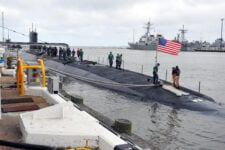
The Drone Dome System, manufactured by Rafael, uses the same counter-UAS technology as Israel’s Iron Dome. (Photo provided by Parsons.)
MODERN DAY MARINE 2024 — The defense tech firm Parsons is teaming up with an American subsidiary of Israel’s Rafael to bid for a pending Marine Corps contract to protect the service’s installations around the world from small aerial drone threats, executives from both companies told Breaking Defense in an exclusive interview.
The competition in question is being managed by the service’s Program Executive Office for Land Systems and is seeking technology capable of detecting and neutralizing small group one and group two unmanned aerial systems that approach Marine Corps installations. (The Pentagon classifies UAS in groups, with the first group representing small handheld drones up to group five, which are similar in size to manned helicopters.)
The executives said the core of their bid will include Rafael’s Drone Dome System, the same technology Israel’s Iron Dome uses to defeat small UAS, while Parsons will be the prime contractor providing program management, sustainment and systems integration.
“Rafael has fielded the Drone Dome system since 2016,” Eric Brown, chief technology officer at Rafael Systems Global Sustainment, said in an April 24 interview. “It’s tested, it’s proven. [Rafael is] the prime supplier of counter UAS for the country of Israel.”
Brown said the Drone Dome system includes an active detection radar, an electro-optical and infrared camera, a passive radio frequency detection system and an electronic warfare jammer.
“The unique piece of this that I think Rafael has mastered is the sensor-effector integration and the sensor fusion,” he said. “There’s a layered approach to this system, just like the Iron Dome system. … It gets rid of a lot of clutter. It makes it very easy for the user to be able to have a clear situational air picture.”
Chris Hamilton, vice president of Innovative Technology Solutions, a business unit of Parsons, said his company’s role in the teaming arrangement will include sustainment, which for a counter drone system means making sure it’s always functional.
“It can’t be down, it always has to be up,” he said. “As a team, we know these components, we know when you have to either replace parts or have spares in certain places to maintain an almost … constant state of readiness of these systems at all the locations.”
A Marine Corps spokesman told Breaking Defense last week the service had closed the window for companies to submit proposals on April 22 and plans to award a contract to one vendor in the fourth quarter of fiscal year 2024 — which is late summer and early fall of calendar year 2025.
Due to the competitive nature of government contracts, the services generally never comment on how many, or which, companies submitted bids, meaning it’s impossible to know what other industry teams are vying for the work, unless they publicly announce it.
But given all the military services’ recent focus on counter-UAS technologies, as well as the clear need for the technologies being demonstrated in both Ukraine and Israel on a daily basis, the Marines almost certainly have the attention of numerous vendors for their latest program.






















